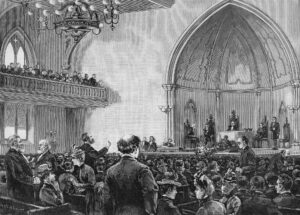Religion News Service recently reported that the author Eugene Peterson affirmed same sex marriage, which many people online took to mean that Peterson had capitulated to cultural pressure.
A day later, Peterson retracted his affirmation of same sex marriage. Retractions, like repentance, are always welcome when a Christian believer returns to biblical fidelity.
Peterson’s affirmation and retraction, however, raise issues of how such a switch like this can happen and whether the retraction goes far enough. Behind these issues lies the problem of ambiguity. It lurks in both Peterson’s affirmation and his retraction, and this problem affects Canadian churches, denominations, and schools.
Peterson in Review
Peterson’s biblical expositions are filled with poetic rhythm and wildlife sympathies. It’s no wonder that the long-time professor at Vancouver’s Regent College has been admired by Canadian Evangelicals for so long.
Peterson is well-known through his many books written mostly on biblical and pastoral themes. His early books tended to be engagements with the Bible using the tools of literary criticism as a way of highlighting the texture of Scripture.
His pastoral books followed and I learned much from them, even as I became aware of Peterson’s Barthian sympathies and ecumenical equivalencies. Like Walter Brueggemann and the canonical critics, there was esteem for the Bible but not its inerrancy.
Then came Peterson’s paraphrase of the Bible called The Message. I’ve heard it read from Canadian pulpits and seen the misnamed ‘translation’ taken as a goto source for pastors in Canada looking for a fresh way to connect the Bible with their people.
The Ambiguity of The Message
Looking at The Message gives us a clue as to why Peterson would be ambiguous and flip flop on same sex marriage. Put simply, Peterson’s paraphrase is a study in ambiguity.
For example read how he renders Romans 1:26-27 in The Message:
Worse followed. Refusing to know God, they soon didn’t know how to be human either—women didn’t know how to be women, men didn’t know how to be men. Sexually confused, they abused and defiled one another, women with women, men with men—all lust, no love. And then they paid for it, oh, how they paid for it—emptied of God and love, godless and loveless wretches.
The phrase “all lust, no love” is the characteristic way of dismissing the Bible’s prohibitions against homosexuality. In Peterson’s turn of phrase, the door is casually left wide open for same-sex marriage with the sole prohibition closed upon non-consensual abuse. Drawing from Peterson’s Bible, there would be no reason to deny same-sex marriage. Same-sex marriage isn’t biblical, but it’s Peterson-biblical. So even if Peterson makes a statement denying the validity of same sex marriage, his literary work seems to be open to it.
Challenging Ambiguity
When Jonathan Merritt asked Peterson about same-sex marriage, you could almost anticipate the answer. Merritt had Peterson make explicit what was implicit from Peterson’s paraphrase.
It was clever work by Merritt to make a prominent Christian leader move from ambiguity to explicit support for the sexual revolution. Peterson still feigned vagueness in the interview, but his support for same sex marriage was unmistakable, though he admitted afterwards that he was mistaken.
Peterson retracted his affirmation of same sex marriage, but it was hardly a clear, precise statement. As a Biblical scholar, Peterson could or perhaps should have made an exegetical argument in his retraction. Instead, he made the strangely vague appeal to a “biblical view of everything.”
Giving Peterson the benefit of the doubt, we will take his retraction for what it is and hope that even in his advanced age he will speak in accord with the sharp edgedness of God’s Word. There is no edge which our age wishes to dull like the Scriptural edges of the one flesh union between male and female.
The Canadian Style?
This middling ambiguity is not new for Canadian Christians. Peterson’s ambiguity has fitted well with a Canadian style of Christianity en vogue for a half century. It has been the practice of Canadian Evangelicals to face the cultural pressures in social ethics by retreating to the safety of vagueness.
Ask a friend who has been involved in their denomination’s discussions about women’s ordination as pastor/elders for example. They will likely tell you that those denominational discussions have promoted ambiguity rather than the clarity of precision. This ambiguity can take the form of refusal to have exegetical debate on the hot topic. Or it can be done by selective promotion of one scholar’s opinion which favours the direction the denominational managers wish to go.
Your denomination may or may not have gone with ambiguity. But the trouble with ambiguity in those other cases is that it merely kicks the can down the road. Or it provides political cover for a preferred outcome without feeling the immediate cost of that choice.
Peterson’s ambiguity couldn’t remain that way for long. All it took was an interviewer to ask the leading questions and the ambiguity was exposed. A choice was made and it left Peterson on the wrong side of the Holy Scriptures over which he has laboured for decades.
We can be thankful that the alarm of the ‘Christian internet’ prompted Peterson to retract his affirmation of same sex marriage. We can pray that he would pursue explicit clarity about the biblical teaching about binary sexes, monogamous heterosexual marriage and the hope of new identity in Christ for any man or women who turns to Jesus Christ in faith alone.
Pastors and parishioners in churches across Canada need to consider whether their ambiguity policy has hidden their true positions on social issues, and how long it will be until someone calls them out and forces them to make explicit what was implicit all along.
Ambiguity can be crafted in clever prose, but the clarity of God’s Word cuts through all of that. As Paul put it, “my speech and my message were not in plausible words of wisdom, but in demonstration of the Spirit and of power”(1 Cor 2.4).
In the end, the message of the Word of God is the unambiguous message that will prevail.
























